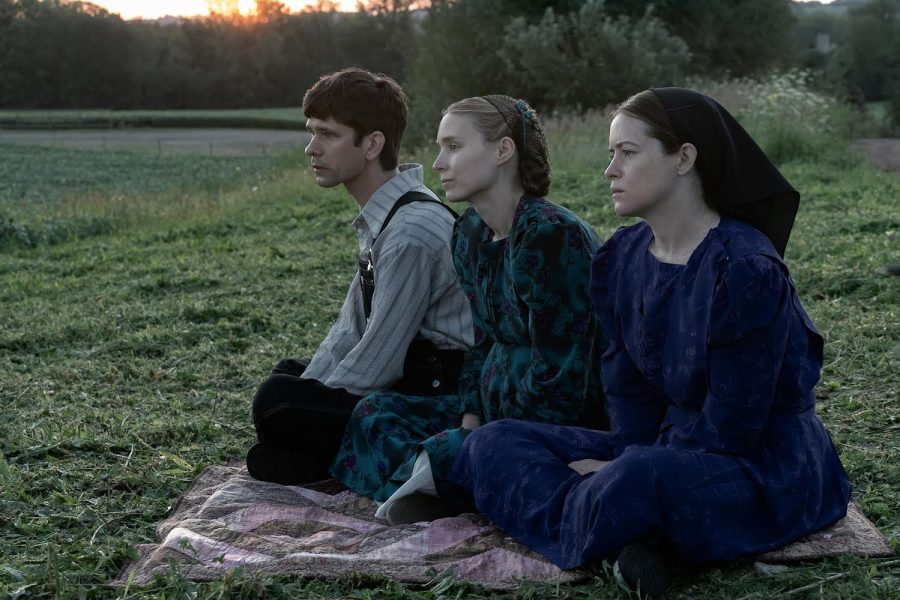Why you need to watch ‘Women Talking’
Powerful film gives voice to the silenced
January 26, 2023
“How would you feel if, for your entire life, it didn’t matter how you thought?”
This thought-provoking line from Sarah Polley’s “Women Talking” sparks the conversation of a lifetime. Picture this: it’s 2010 in a remote Canadian Mennonite colony. For the past two years, the women of the colony have been preyed upon, drugged and raped by several unnamed men. The colony’s elders attributed the attacks to evil spirits and refused to listen to the women. After a couple of the men were jailed in a nearby town and the rest went to bail them out, the women had one day alone to decide what to do. They knew one thing — they could not continue to live in fear. This left them with two options: they could either flee the colony or stay and fight for change. The movie follows a group of the women, acting as representatives for the rest, who debate the options and eventually have to make a heartbreaking decision.
About 30 minutes in, I couldn’t help but wonder how they managed to extend a debate for two hours long, yet maintain any sort of real plot. The film is essentially one long discussion — and in any discussion, there are only so many points to bring up before the conversation starts going in circles. Eventually, everything has already been hashed out and the women are going over and over the same things. That’s not to say that this isn’t a realistic depiction of discourse. People do tend to go in circles, discussions aren’t always purely efficient. For the sake of this movie, however, they could have cut down on dialogue.
To my delight, the film does venture outside of the little barn where this discussion takes place. Most of the main characters are given brief backstories, with flashbacks to important moments. I appreciated this because it’s impossible to empathize with a character without one-on-one time with them truly. These women deserve for their stories, even in small bits and pieces, to be told. They may be fictional, but they represent real-life women who have been silenced.
My two favorite aspects of this movie were the music, composed by Hildur Gudnadóttir, and the acting. The music was perfect for this film because it adds another element of depth and emotion to the story itself. Towards the end, the music is used to intensify the decision that the women come to make. The beauty of this music, along with the stunning shots of the landscape, gave me chills.
The ensemble cast, including Claire Foy, Rooney Mara and Jessie Buckley, couldn’t have done a better job. Though each and every actress embodied their characters brilliantly, Jessie Buckley stands out the most. Her character has more depth than the other, as she was hard to read at first, but Buckley slowly revealed her character’s vulnerabilities. The other standout performance was that of Claire Foy. Her character posed a contrasting voice to Buckley’s. They held opposite beliefs on what to do. Foy could not stand another day in the colony, while Buckley felt leaving was cowardice. In the end, though, the two women realize that they are fighting for the same end goal: safety. These two had perfect on-screen chemistry and I hope to see them reunited in another film soon.
My most pressing criticism lies within the script. The writing is extremely poetic, really to the point where it loses credibility. A powerful line is all the more impactful when it stands out, but in this movie, nearly every piece of dialogue is poignant and well-spoken. At times, the dialogue feels like unrealistic Oscar-bait. The only time I would actually imagine for a group of people to speak so beautifully in casual conversation is at a poetry convention, or maybe a Shakespeare reenactment. For a story that is so dialogue-driven, it’s crucial that the writing be believable. I wish the writing better reflected the way that people actually talk. This melodramatic screenplay’s only real purpose is sucking up to The Academy. Evidently, this worked out because the film scored a best picture nomination.
In conclusion, this is a powerhouse of a movie that I highly recommend. It is modeled after a real-life event, and the themes discussed are ones that many women can relate to. This is the kind of story that needs to be told, and I urge you to go see it. This story lingered with me long after I finished watching it unfold.
“Women Talking:” ★★★★☆




